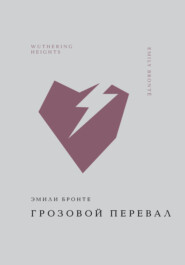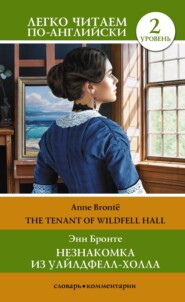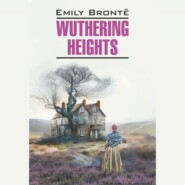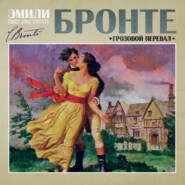По всем вопросам обращайтесь на: info@litportal.ru
(©) 2003-2025.
✖
Лучшие романы сестер Бронте / The best of the Brontë sisters
Настройки чтения
Размер шрифта
Высота строк
Поля
The other members of the household, viz.,[34 - viz. – that is] John and his wife, Leah the housemaid, and Sophie the French nurse, were decent people; but in no respect remarkable; with Sophie I used to talk French, and sometimes I asked her questions about her native country; but she was not of a descriptive or narrative turn, and generally gave such vapid and confused answers as were calculated rather to check than encourage inquiry.
October, November, December passed away. One afternoon in January, Mrs. Fairfax had begged a holiday for Ad?le, because she had a cold; and, as Ad?le seconded the request with an ardour that reminded me how precious occasional holidays had been to me in my own childhood, I accorded it, deeming that I did well in showing pliability on the point. It was a fine, calm day, though very cold; I was tired of sitting still in the library through a whole long morning: Mrs. Fairfax had just written a letter which was waiting to be posted, so I put on my bonnet and cloak and volunteered to carry it to Hay; the distance, two miles, would be a pleasant winter afternoon walk. Having seen Ad?le comfortably seated in her little chair by Mrs. Fairfax’s parlour fireside, and given her her best wax doll (which I usually kept enveloped in silver paper in a drawer) to play with, and a story-book for change of amusement; and having replied to her “Revenez bient?t, ma bonne amie, ma ch?re Mdlle. Jeannette,”[35 - Revenez bient?t, ma bonne amie, ma ch?re Mdlle. Jeannette. – Come back soon, my good friend, my dear Miss Jane.] with a kiss I set out.
The ground was hard, the air was still, my road was lonely; I walked fast till I got warm, and then I walked slowly to enjoy and analyse the species of pleasure brooding for me in the hour and situation. It was three o’clock; the church bell tolled as I passed under the belfry: the charm of the hour lay in its approaching dimness, in the low-gliding and pale-beaming sun. I was a mile from Thornfield, in a lane noted for wild roses in summer, for nuts and blackberries in autumn, and even now possessing a few coral treasures in hips and haws, but whose best winter delight lay in its utter solitude and leafless repose. If a breath of air stirred, it made no sound here; for there was not a holly, not an evergreen to rustle, and the stripped hawthorn and hazel bushes were as still as the white, worn stones which causewayed the middle of the path. Far and wide, on each side, there were only fields, where no cattle now browsed; and the little brown birds, which stirred occasionally in the hedge, looked like single russet leaves that had forgotten to drop.
This lane inclined up-hill all the way to Hay; having reached the middle, I sat down on a stile which led thence into a field. Gathering my mantle about me, and sheltering my hands in my muff, I did not feel the cold, though it froze keenly; as was attested by a sheet of ice covering the causeway, where a little brooklet, now congealed, had overflowed after a rapid thaw some days since. From my seat I could look down on Thornfield: the grey and battlemented hall was the principal object in the vale below me; its woods and dark rookery rose against the west. I lingered till the sun went down amongst the trees, and sank crimson and clear behind them. I then turned eastward.
On the hill-top above me sat the rising moon; pale yet as a cloud, but brightening momentarily, she looked over Hay, which, half lost in trees, sent up a blue smoke from its few chimneys: it was yet a mile distant, but in the absolute hush I could hear plainly its thin murmurs of life. My ear, too, felt the flow of currents; in what dales and depths I could not tell: but there were many hills beyond Hay, and doubtless many becks threading their passes. That evening calm betrayed alike the tinkle of the nearest streams, the sough of the most remote.
A rude noise broke on these fine ripplings and whisperings, at once so far away and so clear: a positive tramp, tramp, a metallic clatter, which effaced the soft wave-wanderings; as, in a picture, the solid mass of a crag, or the rough boles of a great oak, drawn in dark and strong on the foreground, efface the a?rial distance of azure hill, sunny horizon, and blended clouds where tint melts into tint.
The din was on the causeway: a horse was coming; the windings of the lane yet hid it, but it approached. I was just leaving the stile; yet, as the path was narrow, I sat still to let it go by. In those days I was young, and all sorts of fancies bright and dark tenanted my mind: the memories of nursery stories were there amongst other rubbish; and when they recurred, maturing youth added to them a vigour and vividness beyond what childhood could give. As this horse approached, and as I watched for it to appear through the dusk, I remembered certain of Bessie’s tales, wherein figured a North-of-England spirit called a “Gytrash,” which, in the form of horse, mule, or large dog, haunted solitary ways, and sometimes came upon belated travellers, as this horse was now coming upon me.
It was very near, but not yet in sight; when, in addition to the tramp, tramp, I heard a rush under the hedge, and close down by the hazel stems glided a great dog, whose black and white colour made him a distinct object against the trees. It was exactly one form of Bessie’s Gytrash – a lion-like creature with long hair and a huge head: it passed me, however, quietly enough; not staying to look up, with strange pretercanine eyes, in my face, as I half expected it would. The horse followed, – a tall steed, and on its back a rider. The man, the human being, broke the spell at once. Nothing ever rode the Gytrash: it was always alone; and goblins, to my notions, though they might tenant the dumb carcasses of beasts, could scarce covet shelter in the commonplace human form. No Gytrash was this, – only a traveller taking the short cut to Millcote. He passed, and I went on; a few steps, and I turned: a sliding sound and an exclamation of “What the deuce is to do now?” and a clattering tumble, arrested my attention. Man and horse were down; they had slipped on the sheet of ice which glazed the causeway. The dog came bounding back, and seeing his master in a predicament, and hearing the horse groan, barked till the evening hills echoed the sound, which was deep in proportion to his magnitude. He snuffed round the prostrate group, and then he ran up to me; it was all he could do, – there was no other help at hand to summon. I obeyed him, and walked down to the traveller, by this time struggling himself free of his steed. His efforts were so vigorous, I thought he could not be much hurt; but I asked him the question –
“Are you injured, sir?”
I think he was swearing, but am not certain; however, he was pronouncing some formula which prevented him from replying to me directly.
“Can I do anything?” I asked again.
“You must just stand on one side,” he answered as he rose, first to his knees, and then to his feet. I did; whereupon began a heaving, stamping, clattering process, accompanied by a barking and baying which removed me effectually some yards’ distance; but I would not be driven quite away till I saw the event. This was finally fortunate; the horse was re-established, and the dog was silenced with a “Down, Pilot!” The traveller now, stooping, felt his foot and leg, as if trying whether they were sound; apparently something ailed them, for he halted to the stile whence I had just risen, and sat down.
I was in the mood for being useful, or at least officious, I think, for I now drew near him again.
“If you are hurt, and want help, sir, I can fetch some one either from Thornfield Hall or from Hay.”
“Thank you: I shall do: I have no broken bones, – only a sprain;” and again he stood up and tried his foot, but the result extorted an involuntary “Ugh!”
Something of daylight still lingered, and the moon was waxing bright: I could see him plainly. His figure was enveloped in a riding cloak, fur collared and steel clasped; its details were not apparent, but I traced the general points of middle height and considerable breadth of chest. He had a dark face, with stern features and a heavy brow; his eyes and gathered eyebrows looked ireful and thwarted just now; he was past youth, but had not reached middle-age; perhaps he might be thirty-five. I felt no fear of him, and but little shyness. Had he been a handsome, heroic-looking young gentleman, I should not have dared to stand thus questioning him against his will, and offering my services unasked. I had hardly ever seen a handsome youth; never in my life spoken to one. I had a theoretical reverence and homage for beauty, elegance, gallantry, fascination; but had I met those qualities incarnate in masculine shape, I should have known instinctively that they neither had nor could have sympathy with anything in me, and should have shunned them as one would fire, lightning, or anything else that is bright but antipathetic.
If even this stranger had smiled and been good-humoured to me when I addressed him; if he had put off my offer of assistance gaily and with thanks, I should have gone on my way and not felt any vocation to renew inquiries: but the frown, the roughness of the traveller, set me at my ease: I retained my station when he waved to me to go, and announced –
“I cannot think of leaving you, sir, at so late an hour, in this solitary lane, till I see you are fit to mount your horse.”
He looked at me when I said this; he had hardly turned his eyes in my direction before.
“I should think you ought to be at home yourself,” said he, “if you have a home in this neighbourhood: where do you come from?”
“From just below; and I am not at all afraid of being out late when it is moonlight: I will run over to Hay for you with pleasure, if you wish it: indeed, I am going there to post a letter.”
“You live just below – do you mean at that house with the battlements?” pointing to Thornfield Hall, on which the moon cast a hoary gleam, bringing it out distinct and pale from the woods that, by contrast with the western sky, now seemed one mass of shadow.
“Yes, sir.”
“Whose house is it?”
“Mr. Rochester’s.”
“Do you know Mr. Rochester?”
“No, I have never seen him.”
“He is not resident, then?”
“No.”
“Can you tell me where he is?”
“I cannot.”
“You are not a servant at the hall, of course. You are – ” He stopped, ran his eye over my dress, which, as usual, was quite simple: a black merino cloak, a black beaver bonnet; neither of them half fine enough for a lady’s-maid. He seemed puzzled to decide what I was; I helped him.
“I am the governess.”
“Ah, the governess!” he repeated; “deuce take me, if I had not forgotten! The governess!” and again my raiment underwent scrutiny. In two minutes he rose from the stile: his face expressed pain when he tried to move.
“I cannot commission you to fetch help,” he said; “but you may help me a little yourself, if you will be so kind.”
“Yes, sir.”
“You have not an umbrella that I can use as a stick?”
“No.”
“Try to get hold of my horse’s bridle and lead him to me: you are not afraid?”
I should have been afraid to touch a horse when alone, but when told to do it, I was disposed to obey. I put down my muff on the stile, and went up to the tall steed; I endeavoured to catch the bridle, but it was a spirited thing, and would not let me come near its head; I made effort on effort, though in vain: meantime, I was mortally afraid of its trampling fore-feet. The traveller waited and watched for some time, and at last he laughed.
“I see,” he said, “the mountain will never be brought to Mahomet, so all you can do is to aid Mahomet to go to the mountain; I must beg of you to come here.”
I came. “Excuse me,” he continued: “necessity compels me to make you useful.” He laid a heavy hand on my shoulder, and leaning on me with some stress, limped to his horse. Having once caught the bridle, he mastered it directly and sprang to his saddle; grimacing grimly as he made the effort, for it wrenched his sprain.
“Now,” said he, releasing his under lip from a hard bite, “just hand me my whip; it lies there under the hedge.”
I sought it and found it.
“Thank you; now make haste with the letter to Hay, and return as fast as you can.”
A touch of a spurred heel made his horse first start and rear, and then bound away; the dog rushed in his traces; all three vanished,
“Like heath that, in the wilderness,
The wild wind whirls away.”[36 - It’s a quotation from the poem “Fallen is thy Throne” by Thomas Moore.]
I took up my muff and walked on. The incident had occurred and was gone for me: it was an incident of no moment, no romance, no interest in a sense; yet it marked with change one single hour of a monotonous life. My help had been needed and claimed; I had given it: I was pleased to have done something; trivial, transitory though the deed was, it was yet an active thing, and I was weary of an existence all passive. The new face, too, was like a new picture introduced to the gallery of memory; and it was dissimilar to all the others hanging there: firstly, because it was masculine; and, secondly, because it was dark, strong, and stern. I had it still before me when I entered Hay, and slipped the letter into the post-office; I saw it as I walked fast down-hill all the way home. When I came to the stile, I stopped a minute, looked round and listened, with an idea that a horse’s hoofs might ring on the causeway again, and that a rider in a cloak, and a Gytrash-like Newfoundland dog, might be again apparent: I saw only the hedge and a pollard willow before me, rising up still and straight to meet the moonbeams; I heard only the faintest waft of wind roaming fitful among the trees round Thornfield, a mile distant; and when I glanced down in the direction of the murmur, my eye, traversing the hall-front, caught a light kindling in a window: it reminded me that I was late, and I hurried on.
I did not like re-entering Thornfield. To pass its threshold was to return to stagnation; to cross the silent hall, to ascend the darksome staircase, to seek my own lonely little room, and then to meet tranquil Mrs. Fairfax, and spend the long winter evening with her, and her only, was to quell wholly the faint excitement wakened by my walk, – to slip again over my faculties the viewless fetters of an uniform and too still existence; of an existence whose very privileges of security and ease I was becoming incapable of appreciating. What good it would have done me at that time to have been tossed in the storms of an uncertain struggling life, and to have been taught by rough and bitter experience to long for the calm amidst which I now repined! Yes, just as much good as it would do a man tired of sitting still in a “too easy chair” to take a long walk: and just as natural was the wish to stir, under my circumstances, as it would be under his.

















